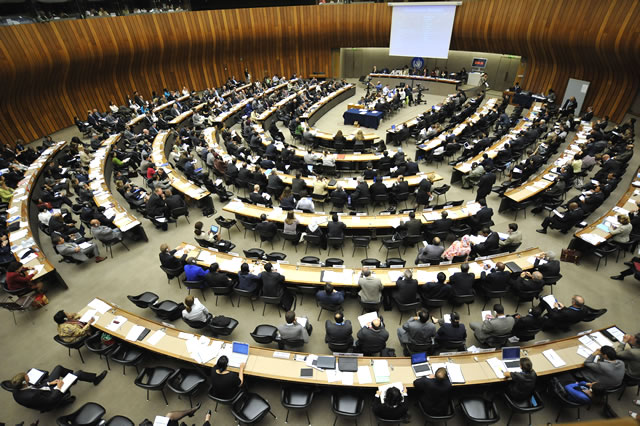The business and human rights agenda, long critiqued for its voluntary principles and soft standards, has made progress in strengthening accountability mechanisms that help prevent abuse of human rights. Energy has intensified around governmental obligations to put in place laws and enforcement mechanisms that require corporate respect for human rights.
One must credit the United Nations Guiding Principles on Business and Human Rights, which were endorsed in 2011 by the Human Rights Council, for providing a strong framework for action on this agenda, including by elaborating the relevant obligations of governments and the responsibilities of corporations in terms of human rights. Through careful and considered follow-up, civil society groups have successfully pushed for the integration of elements in the UNGPs into law. Many companies too have made efforts to engage internally and through their business relationships with these issues. The Global Business Initiative, a coalition of leading businesses working to integrate and act on the UNGPs, have been at the forefront of the agenda.
With this good work happening, persistent gaps in protection and enforcement linger and create situations where abuses occur across all industries and across all rights.
Civil society groups and social movements have been clamoring for more. Balking at the lip service and inaction apparent across many governments and companies, these groups noted that stronger rules needed to be developed. They pushed for the adoption of a landmark process to begin to develop a draft international regulatory instrument over transnational corporations. An Intergovernmental Working Group was thereby created to develop a potential regulatory instrument at the international level to help close these gaps.
And so, with the creation of this Intergovernmental Working Group, the movement for business and human rights seemed to be at a split in the road. Going left would mean pushing for strong content and clarification of legal obligations through an international instrument. Staying right would mean continuing to nudge governments and companies to move on implementing measures like due diligence and supply chain transparency. Which journey is longer and more fraught with potential potholes that could derail progress in building stronger protections for human rights?
The answer: neither, for there is no split in the road. There are significant gains that can be achieved from continuing to advocate and push governments and corporations along in implementing the UNGPs and other business and human rights frameworks. These efforts should not compromise, nor be compromised by, efforts to develop content for a possible international legal instrument. The caravan toward business respect for human rights simply gets longer.
Many would argue that precedents exist that showcase the challenges in developing international consensus around normative standards without sufficient state practice. However, state practice is emerging in the business and human rights arena. Governments are increasingly putting laws and policies into place that relate to business and human rights issues. See the developments around non-financial reporting in the European Union and the various listing requirements across world stock exchanges, for example. And many governments have embraced the Human Rights Council’s call to develop National Action Plans on business and human rights, with some having already completed the process.
Also, the public awareness and uptake of the business and human rights agenda is only increasing. One need only look at the way these issues are increasingly covered in popular press and the development of discreet hubs for discourse on these issues in major news sites, including the Guardian. This public attention feeds responses both at the policy and company levels, and propels state practice forward on these issues.
Importantly, we cannot afford to wait for state practice to fully develop. Progress must be made, and made quickly. With the clamoring towards privatization of resources, the pace and direction of globalization is increasingly shifting. Companies are no longer content with extracting minerals and shaving down forests. Instead, new global powers are increasingly acquiring land and water resources. These investments have massive potential to impact human rights, and policy and practice must respond.
Finally, global agreement is desperately needed on areas where governments have been so reluctant to regulate and enforce: around remedy. There was hope that the UNGPs would spur real reforms in this area, by perhaps opening up opportunities for claimants to vindicate their rights in courts, by integrating liability for companies and executives for human rights harms in criminal and civil codes, and through pressing companies themselves to tackle the issue through robust and reliable grievance mechanisms. This is simply not happening and, in many cases, the opposite phenomena is occurring. And perhaps it is too much to assume that governments would unilaterally act on these remedial measures. The equities weigh so hard against such unilateral action given the increasingly dependent relationship of our governments to private enterprise. To counteract this paralysis, an international process could clarify legal obligations and encourage their uptake by balancing out the power disparity.
So where does this leave us? Shall the dominant narrative be that we stand at a split in the road with the treaty process to our left and reforms in state practice on the right? Or shall we overcome potential divisiveness and see the journey as one long road towards greater protection of human rights? Viewing it as such means that we can be ready for a discussion on international legal principles while we continue to build domestic and company level progress. This must be our way forward. By rejecting an either/or narrative, efforts to extend human rights protection in business activities can continue to expand and evolve at all levels. The caravan toward business respect for human rights simply gets longer.





























How should businesses respond to an age of conflict and uncertainty?
As 2024 began, European Commission President Ursula von der Leyen aptly summed up our deeply worrying collective moment. As she put it, speaking at the annual World Economic Forum in Switzerland, we are moving through “an era of conflict and...
26 March 2024 | Commentary
Commentary by Scott Jerbi, Senior Advisor, Policy & Outreach, IHRB